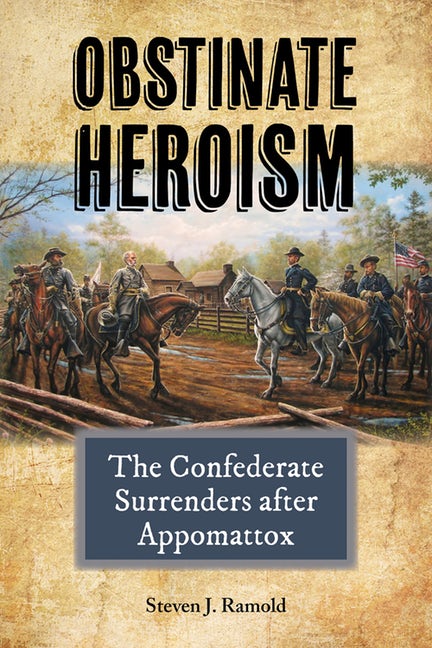Professor Steven Ramold Publishes Obstinate Heroism
The latest book by Professor of History Steven Ramold, Obstinate Heroism: The Confederate Surrenders after Appomattox, was recently released by the University of North Texas Press. The book, Professor Ramold’s fourth monograph, examines the termination of the American Civil War through the surrenders of the last Confederate armies in remote corners of the South. The generals commanding each of the Confederate forces had the choice to continue the war, but disparate circumstances denied them the ability to defend their short-lived nation.


The cessation of armed conflicts is seldom easy, and the American Civil War was no exception. The common image from Appomattox is a reserved but defeated Robert E. Lee surrendering his Confederate army to the magnanimous Union commander Ulysses S. Grant. The reality, however, was much more complicated and messy. Three Confederate armies and numerous smaller commands, totaling tens of thousands of soldiers, remained in the field with the option of continuing the war if they chose to do so. Thankfully, the commanders of all three Confederate armies decided to accept the Union’s demands to surrender, bringing the Civil War to an end weeks after the events at Appomattox. Each of the Confederate commanders had different options and difficulties when deciding the future of their commands. Joseph Johnston, commanding in North Carolina, ultimately surrendered to William Tecumseh Sherman, but only after a desperate battle to save the state. In Alabama, Richard Taylor surrendered to Edward Canby after finding himself caught between two large Union invasion forces that threatened to overrun the region. Edmund Kirby Smith, commanding the Trans-Mississippi Department, faced no immediate Union military threat, but collapsing economic conditions led to mass desertions that left Kirby Smith a general without an army.
All of the surrenders were complicated by other complex factors. Confederate President Jefferson Davis, made a fugitive by the fall of Richmond, played only a small role in the final failure of his government. The failure of the Confederate economy sapped both the capability of the nation and the morale of its citizens, leading to widespread demands for peace. The personalities of Johnston, Taylor, and Kirby Smith all contributed to their decisions to surrender, as each general had their own motivations to cease hostilities.


“Deeply researched and elegantly written, Obstinate Heroism offers the best scholarly explanation of why and how Confederates ingloriously yet often grudgingly succumbed to defeat after Lee’s surrender. It is a complex and far-reaching story—stretching from the Carolinas to Alabama and the trans-Mississippi—revealing the Union military’s merciless pressures on desperate Confederate soldiers, commanders, political leaders, and civilians, who gradually crumbled and finally failed in their stubborn fight for independence.” – T. Michael Parrish, author of Richard Taylor: Soldier Prince of Dixie.
Prof. Ramold has served in the Department of History and Philosophy at Eastern Michigan University since 2005. He is the author of three other books: Slaves, Sailors, Citizens: African Americans in the Union Navy (University of Northern Illinois, 2001), Baring the Iron Hand: Discipline in the Union Army (University of Northern Illinois, 2009), and Across the Divide: Union Soldiers View the Northern Home Front (New York University Press, 2013). He teaches courses in nineteenth century U.S. history, U.S. military history, and sports history.

